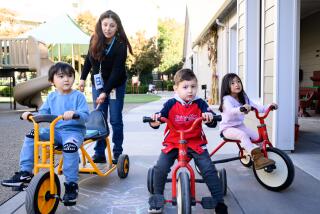Don’t punish bullies of school bus monitor, parenting expert says
- Share via
The New York middle school students caught on video taunting and mocking a 68-year-old school bus monitor don’t deserve to be punished, says parenting expert Jane Nelson.
Everyone else in America might be calling for harsh, swift justice to be meted out by both the Greece Central School District and the parents of the kids involved. But not Nelson.
Co-author of two dozen parenting books including the “Positive Discipline” series, Nelson says the traditional means of punishment -- yelling, shaming, hitting, grounding, etc. -- are counterproductive.
“I think to go after these kids in a punitive way, it just doesn’t help,” she said. Nelson knows that the vast majority of parents will scoff both at that notion -- and at her belief that the young bullies are merely acting out due to their own “need for a sense of significance and belonging.”
Even so, she suggests that the parents of the bullies embark on a four-step process to set aside their anger, take the time to emotionally connect with the misbehaving kids, find the reason behind the misdeeds, and then help the kids learn and grow from their mistakes.
During a lengthy telephone interview with the Los Angeles Times, she made a compelling case for this perhaps counterintuitive point of view. Here’s what she had to say:
“We have the mistaken idea, the crazy idea, that in order to make kids do better, we have to make them feel sorry, guilty and ashamed as a way of getting them to do better,” she said. “But as adults, when we are put down, humiliated, insulted, and made to feel bad and inadequate, we don’t think, ‘Oh, goody, I can’t wait to do better next time.’”
She speculated that the children involved in the bullying incident are not monsters -- and are likely to have been the victims of bullying themselves at home. “Kids live what they learn,” Nelson said. “So these kids bully in turn. When kids do hurtful things, it’s because they are hurt.”
Yelling and punishing makes parents feel better, she said, but it drives children to the Four Rs, as she calls them: rebellion, resentment, revenge and retreat. “They think, ‘I just won’t get caught next time.’ Or, ‘OK, I’ll be good.’ But that desire is out of fear, not an inner desire to improve.”
Nelson’s method -- the positive discipline she teaches -- encourages a parent to first find out, in a sympathetic and nonjudgmental way, why the child did what he or she did, and then allow the child to see the error of those ways. “I call it ‘connection before correction.’”
So what would Nelson do if her child was one of the bullies? She drew from one of her personal experiences raising seven children.
Many years ago, Nelson’s daughter was caught with other neighborhood children using oranges to bomb a neighbor’s car. Nelson started with open-ended, curious and nonjudgmental questions to create a connection with her child. (Tone is everything, as you might imagine.) Once Nelson had all the details, she turned it into a teaching moment. The conversation went something like this: “I’m so sorry that this happened, tell me about it.” “What were you feeling at the time?” “How do you think the neighbor felt?” “How would you feel if you had a new car and someone hit it with oranges?”
That line of questioning leads to the big question: “What do you think we can do to resolve this issue?” Nelson said her daughter, all on her own, came to a conclusion: She needed to apologize in person, also write an apology letter, and spend a day cleaning the neighbor’s car by hand.
Such consequences will ultimately teach a child why it’s important to respect others, in addition to providing a deterrent, Nelson said.
If you think Nelson’s way sounds crazy, consider this: “The spanking debate has been going on for centuries,” she said. “Everybody is going for the quick fix, and it’s just never going to solve things. It hasn’t so far.”
ALSO:
Colorado firefighters hampered by winds, heat -- and meteors
Video: George Zimmerman describes Trayvon Martin encounter
Summer solstice 2012: Did you miss the longest day of the year?
Join Rene Lynch on Google+ or Twitter. Email: rene.lynch@latimes.com
More to Read
Sign up for Essential California
The most important California stories and recommendations in your inbox every morning.
You may occasionally receive promotional content from the Los Angeles Times.











